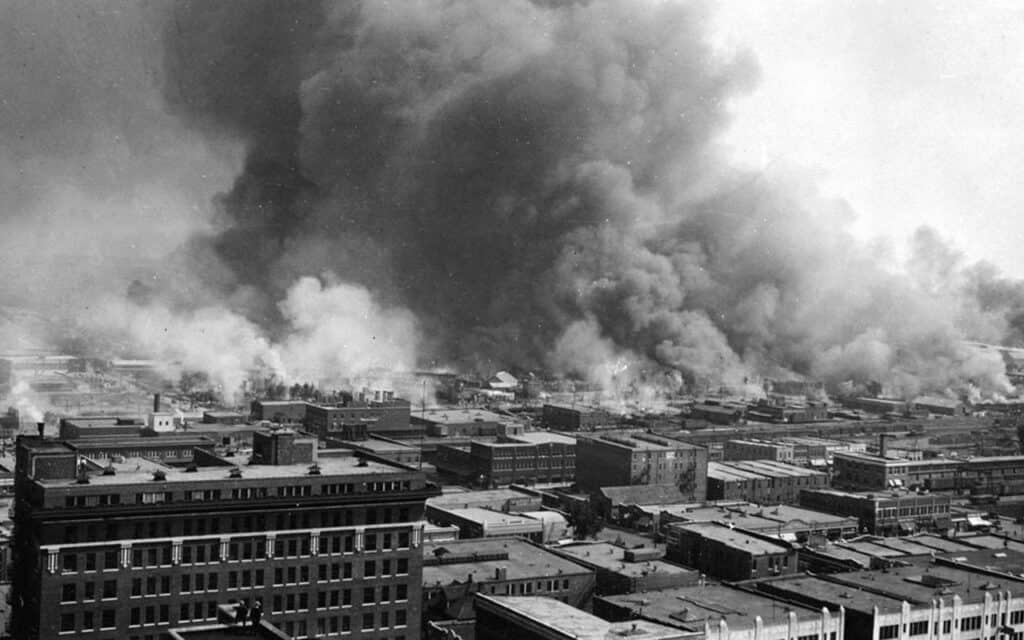The 100 year anniversary of the Tulsa Race Massacre reminds us of the ongoing inequalities Black enterprises face in building communal wealth and prosperity. While Greenwood (aka the Black Wall Street) was literally set to flames in 1921, the veiled injustices that Black small businesses fight today are equally cruel and threaten not only the economic well being of Black people but the culture and history of Black neighborhoods.
Starting a small business is considered to be as patriotic as apple pie, but maintaining a successful small business continues to be a privilege that is rare for Black entrepreneurs. Although Black Americans start businesses at higher rates than other races, they are also more likely to have their businesses dissolve after 18 months. Ongoing disparities in accessing capital and acquiring business development opportunities (such as procurement dollars) have withheld Black businesses from flourishing and producing more wealth in Black communities.
While some Black businesses have managed to fight against persistent inequalities, it is becoming increasingly hard for them to fight gentrification, and now a pandemic. Black commercial corridors in cities like Oakland, Miami, Washington, D.C, and New York have had high rates of business displacement and closure for years. Since the pandemic, Black business owners reported they weren’t working disproportionately more than White business owners due to the pandemic, and were more likely to encounter difficulties receiving federal relief funds. This is more than an unfortunate truth for individual entrepreneurs. The removal of Black businesses threatens the cultural and historic fabric of historically Black neighborhoods. When the businesses are gone, the Black experience and history that anchored those communities are also removed.
For America to truly be accountable for the Tulsa Race Massacre, we must systematically address the racism that has left Black commercial corridors in peril and has prevented other Black Wall Streets from flourishing.
The Biden-Harris administration’s recent commitments to build Black wealth and narrow the racial wealth gaps are commendable. The creation of an interagency effort to address inequities in home appraisals and leveraging the federal government’s purchasing power are laudable steps to help Black Americans access wealth building vehicles that have been known to help their White counterparts. Yet these commitments should be coupled with clear goals for how the administration will measure its success and impact in increasing federal supplier diversity.
The administration’s proposal for community revitalization should also explicitly target low-wealth communities. As demonstrated by PPP lending, blanketed language like “economic underdeveloped or underserved communities” is unsuccessful in reaching Black businesses. There are systemic barriers that prevent Black businesses from capital and must be addressed when deploying funds. All investments should explicitly target low-wealth communities, who are overwhelmingly Black, to ensure that investments are prioritizing those most in need.
In addition to these new initiatives, the administration should prioritize reforming long-standing community development policies, such as the Community Reinvestment Act and Opportunity Zones. These federal mandates are institutional systems that are designed to channel private investment into underserved communities and should be reformed to better reach Black neighborhoods and businesses. More specifically, the definitions and eligibility criteria used to guide community development investments should prioritize low-wealth areas and people, rather than “low- and moderate-income.” Wealth is a more accurate measure of economic well-being. This will ensure that there are long-term mechanisms in place to invest in Black neighborhoods outside of one-time executive commitments.
Strong Black businesses are a fundamental component of Black wealth building and communal resilience. They are havens for African American ingenuity and stewards of the culture and history. As we reflect on the Tulsa Race Massacre and the stolen promise of Black Wall Street, let’s call for targeted investments and attention to Black businesses to help them overcome historical inequities and preserve Black neighborhoods.
Sabrina Terry is NCRC’s Chief of Programs and Strategic Development.
Photo via Wikimedia.



